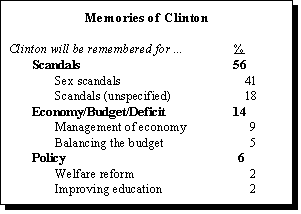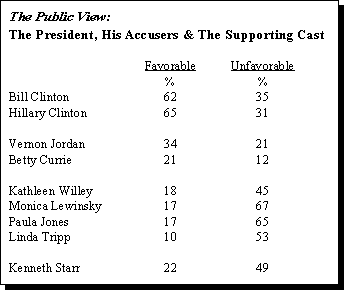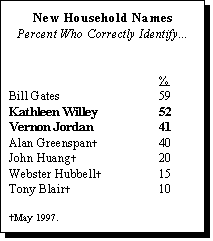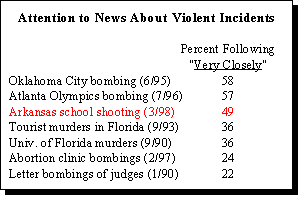Popular Today vs. Legacy Tomorrow
The steady stream of allegations involving a White House sex scandal and cover-up has not eroded President Clinton’s popularity. And while the story continues to interest the public, it appears to have lost some of its resonance: The number of people saying Clinton should be impeached if he lied under oath has dropped 10 percentage points since early February.
But this is not to say the controversy is without negative consequences for the President. More than 40% of Americans say the allegations have diminished their respect for Clinton as a person. And when asked what Clinton will be remembered for, scandals get mentioned far more often than any policy achievement.
 Fully 65% of the public today approves of President Clinton’s job performance. This is down 6 percentage points from the early February peak, but it is still higher than at any pre-scandal point in his presidency. Moreover, Clinton’s approval is hardy: A 43% plurality say they very strongly approve of his performance as president. This matches Ronald Reagan’s support at a comparable point in his second term.
Fully 65% of the public today approves of President Clinton’s job performance. This is down 6 percentage points from the early February peak, but it is still higher than at any pre-scandal point in his presidency. Moreover, Clinton’s approval is hardy: A 43% plurality say they very strongly approve of his performance as president. This matches Ronald Reagan’s support at a comparable point in his second term.
This enthusiastic approval of Clinton’s job performance, however, does not carry over to him as an individual. While just 27% of the public says the allegations of sexual misconduct by Clinton have marred their confidence in his leadership abilities, 43% says the allegations have reduced their respect for him as a person.
While men and women do not differ in their evaluations of the scandal’s impact on their opinions, Democrats and Republicans do — dramatically so. Half of all Republicans (54%) compared to just 9% of Democrats and 26% of Independents say the allegations have reduced their confidence in Clinton’s leadership; 68% of Republicans say the allegations have reduced their respect for him as a person compared to 25% of Democrats and 43% of Independents.
 The public acknowledges Clinton’s accomplishments but also casts doubt on whether he will be remembered for these successes. Asked about the President’s “greatest accomplishment” since he took office, Americans list a strong economy and the balanced budget (33%) and other policies (17%). But when asked what the President will be “most remembered for,” 56% mention the scandals and allegations raised against Clinton.
The public acknowledges Clinton’s accomplishments but also casts doubt on whether he will be remembered for these successes. Asked about the President’s “greatest accomplishment” since he took office, Americans list a strong economy and the balanced budget (33%) and other policies (17%). But when asked what the President will be “most remembered for,” 56% mention the scandals and allegations raised against Clinton.
Fewer Americans say Clinton should be impeached if he is lying about his relationship with Monica Lewinsky, compared to a month ago. Only 40% of the public believes that Clinton should be impeached if it turns out he lied under oath. This is a drop of 10 percentage points since February, when 50% of the public felt this was an impeachable offense.
However, Americans are divided over whether the President should be impeached if he encouraged Lewinsky to lie under oath (48% yes vs. 47% no), the same as in February. If there was “conclusive proof” of this allegation, fully 54% say they would support impeachment.
Unpopular Accusers
Almost half of the public (49%) gives an unfavorable rating to prosecutor Kenneth Starr; only 22% rates him favorably. Two-thirds of the public has an unfavorable opinion of Paula Jones and Monica Lewinsky (65% and 67%, respectively). Fully 53% have an unfavorable opinion of Linda Tripp and 45% give an unfavorable rating to Kathleen Willey.
 None of these individuals draws a favorable opinion from even a quarter of Americans. Lewinsky gets higher than average ratings from men under age 30 (27% have a favorable opinion of her) and lower than average ratings
None of these individuals draws a favorable opinion from even a quarter of Americans. Lewinsky gets higher than average ratings from men under age 30 (27% have a favorable opinion of her) and lower than average ratings
from young women (15%).
Conversely, Americans hold favorable opinions of President Clinton, Hillary Rodham Clinton and their supporters. Fully 62% of the public views Clinton favorably and 65% gives Mrs. Clinton favorable ratings. In addition, Clinton loyalist Vernon Jordan and presidential secretary Betty Currie are viewed more positively than negatively (34% vs. 21% and 21% vs. 12%, respectively).
Learning to Live with Scandal
Americans are now divided about the significance of the Clinton-Lewinsky scandal. Fully 46% of the public says it is of very little importance, 24% says it is of some importance and 26% says the scandal is of great importance to the nation. This is a substantial change since the story first broke. A CBS News Poll January 24-25 found 40% of the public saying the allegations were of great importance.
The public is inclined to say that news of the scandal is disrupting policy efforts in Washington. Only 32% say the allegations are not disrupting government business, 35% say they are disrupting government a little, 30% say a lot. Republicans see the story as more disruptive than Democrats or Independents (38% say it is disrupting things a lot compared to 24% and 30%, respectively).
The media continues to get mixed reviews for its reporting on the scandal. A 55% majority gives the press an only fair or poor evaluation, compared to 42% who describe media coverage of the story as excellent or good. Senior citizens are the among the harshest in their critique: Only 30% favorably rate the media compared to 56% of those under age 30.
Complaints about the way the media sensationalizes the scandal and reports information before getting all the facts continue to top the list of criticisms raised by those Americans who give the media low marks for its coverage of the allegations against Clinton. In February, the number one criticism of the media concerned reports based on hearsay or unsubstantiated information. In contrast, the top complaint in this month’s survey concerns the media’s continued hyping of the scandal story. Meanwhile, those giving the media high marks continue to praise the press for staying on top of the story and for keeping the public informed about the allegations.
Still Following the Story
Americans remain attentive to the allegations surrounding President Clinton. Two-thirds (65%) of Americans are following news of the investigation closely; 30% are following the news very closely. The public is paying closer attention to this scandal than to previous charges against Clinton. Very close public attention to the Whitewater investigation and the campaign finance scandal never rose above the 25% mark.
 Public attention to the scandal is reflected in knowledge of the players involved on both sides of the investigation. Fully 41% can correctly identify Vernon Jordan, the Washington lawyer and Clinton loyalist who has been subpoenaed by Kenneth Starr, and 52% know who former White House employee Kathleen Willey is. When compared to the public’s knowledge of key figures in previous investigations of Washington leaders, only National Security Advisor John Poindexter had higher name recognition (60%).
Public attention to the scandal is reflected in knowledge of the players involved on both sides of the investigation. Fully 41% can correctly identify Vernon Jordan, the Washington lawyer and Clinton loyalist who has been subpoenaed by Kenneth Starr, and 52% know who former White House employee Kathleen Willey is. When compared to the public’s knowledge of key figures in previous investigations of Washington leaders, only National Security Advisor John Poindexter had higher name recognition (60%).
News Interest Index
The shooting deaths at a middle school in Jonesboro, Arkansas sparked the most interest among major stories in the past month, with nearly half of Americans (49%) following the story very closely. News about the schoolyard shooting drew more attention than continuing reports about allegations against President Clinton (30%) and news about gasoline prices hitting new lows (27%).
Overall, attention to the Arkansas school shooting ranked relatively high compared to other sudden outbreaks of violence in the last decade, ranking third after the Oklahoma City bombing in 1995 and the bomb blast at the 1996 summer Olympics in Atlanta. Women paid closer attention to the school shooting than men (56% following very closely, compared to 40%).
 More than one-quarter of the public paid very close attention to news about the recent drop in gasoline prices. But good news at the gas pump is of substantially less concern to Americans than bad news — news interest was twice as great in late 1990, when as many as 62% of Americans were paying very close attention to increases in gas prices.
More than one-quarter of the public paid very close attention to news about the recent drop in gasoline prices. But good news at the gas pump is of substantially less concern to Americans than bad news — news interest was twice as great in late 1990, when as many as 62% of Americans were paying very close attention to increases in gas prices.
Several foreign affairs and international stories — including President Clinton’s trip to Africa — drew relatively scant interest. Just 12% of Americans closely followed news about Clinton’s visit, though blacks were far more likely than whites to follow the story closely: 25% compared to 11%. Even fewer Americans paid close attention to ethnic conflict in Kosovo, Serbia (5%) and discussions about expanding NATO to include Poland, Hungary and the Czech Republic (5%).
Back home, 20% of the public said they closely followed the NCAA basketball tournament. Interest in the playoffs was higher among men than among women (28% compared to 13%) and especially high among younger men (39%).
Although Bill Gates’ recent testimony before Congress drew scant attention (just 8% followed the story very closely), the Microsoft CEO is an increasingly prominent figure in American life. Fully 59% of Americans could correctly identify Gates, up substantially from June 1997. Not surprisingly, Gates is especially well-known — and well-liked — among those who spend the most time at the computer. An overwhelming 89% of those who regularly go on-line could correctly identify the Microsoft founder, and more than three-in-four (76%) held a favorable opinion of Gates, compared to 55% among the public overall.


